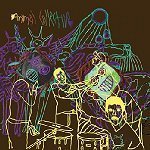
Animal Collective Spirit they're gone, Spirit they're vanished / Danse Manatee
(Fat Cat)
It seems strange to be reviewing a two-CD retrospective of a band who've received the sparsest critical attention and who haven't released another album in this country. Nevertheless, Animal Collective's duplex reissue does exactly that, and offers the listener who hasn't sourced the obscure originals a fine opportunity to appraise the weirdly appealing work of the Collective. Part of the sprawling web of anarcho- noisesmiths that includes the deafeningly brilliant Black Dice or the other collective, Jewelled Antler, the Animals were the talk of New York in 2000, garnering critical acclaim, but lamentably little attention or distribution elsewhere. Time Out NY called Spirit the discovery of the year, and the loose corporation has been winning fans across the blue steadily since. This release comes on the back of a favourably received set of European gigs in May of this year.
Starting out as friends and musical partners in the early 1990s, guitarist Avey Tare and the majestically named drummer Panda Bear are the heart of the Collective. In 2000 they began work under their current guise, and in the past three years have been joined by Brian Weitz (aka Geologist) and Deaken to add complexity to the musical textures on offer. None which quite does justice to the childish and joyful exuberance that's at work on both these discs, as this portmanteau selection showcases an ever-changing dynamic of harmonic and melodic daring heart-set on skewing pop in the strangest directions.
Musically, the collective's references are stated as experimental pop staples - Flaming Lips, Love, Syd Barrett, and early Bowie - which is largely fair. Opener Spirit they've vanished on Spirit is a psychedelic journey into the land of Mercury Rev and the Lips, while April and the Phantom sounds like early Genesis (circa Foxtrot) with disturbing screamed vocals and a fair lick of the Barrett, alarming and compelling at once, but never losing sight of the listener's pleasure. The untitled third track borrows a trick from the Jesus and Mary Chain; what they did to the Beach Boys with feedback, the Animals do to pure pop with Mira Calix style electro blips and whines. It all points to the other key strain in their muse, specifically the Euro avant-garde tradition in art music that takes in Ligeti, the aleatoric compositions of Stockhausen and the mathematical tricks of Yannis Xenakis. What drives this though is a pure sense of pop, as in the Bowie theatricals of Penny Dreadfuls or the Arthur Lee-style vaudeville of Chocolate Girl. My personal favourite though has to be Bat you'll fly, a beautiful piece of electro pop that just sounds like the perfect pill. The whole thing threatens to end in a bloody jazzy mess on Alvin Row, but, hey, who I am I to complain when the ensuing epic synth lullaby, as ever accompanied by aching vocals and tumbling, addictive drumming, is so damn ramblin' good. (8 and a bit)
The band's second album, Danse Manatee, is generally a less rewarding listen. A manatee is a seal-type creature that ancient mariners mistook for sirens - it's where the myth comes from - and whose mating calls are the origin of the song that drove sailors to their deaths. Sonically, the album is exploring darker, more difficult territory, strengthened by the participation of Geologist and Deaken. It's a looser, more anarchic, and at times tribal album. There are fewer lyrics, and vocals are often scarcely audible and seldom intelligible. Electro sounds dominate, but there's also a strong organic heartbeat to proceedings, as on the menacing bass stomp Runnin the round ball or the ultra-basic Ahhh the Good Country. The quasi-title track/opener is much closer to Black Dice, while Meet the light child is an intensely avant-garde experience that probably works better live. It's refreshing to see a band unafraid of discovery or lines of flight, but I not sure it all works - the grunts and panting of Bad Crumbs misfire, and even with the inspired downbeat bumps of Throwin the Round Ball there's nothing as compelling as the standouts on Spirit. In many ways I'd prefer the first album to be the second, as Spirit demonstrates a more complete and approachable work, while Danse, for all its clever experiment with atonality and polyphony, is often too difficult and wilful. (6)
So the moral is, get it and play the albums the wrong way round. My concern is where they go next, as it is a short step from daring to self-indulgence.
16 November, 2003 - 00:00 — Ben Bollig